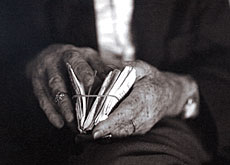
Swiss press in the doldrums

Switzerland's biggest press firms have announced a spate of job cuts amid the worst advertising recession in almost a decade.
And with no prospect of a rebound in the business cycle until well into 2003, many experts are warning of more job cuts and possible takeovers.
“Much of it has been driven by the fact that between 1997 and 2001 strong growth in advertising allowed media companies to expand their capacities,” says Roger Blum, professor of mass communication studies at the University of Bern.
But as revenues from advertising have dried up, many newspapers have been forced to shed jobs or cancel new projects – particularly for online products.
One of Switzerland’s leading dailies, the German-language Neue Zürcher Zeitung, this week announced it would cut 80 posts – or ten per cent of its workforce – in an effort to save SFr20 million ($13.4 million).
The announcement came after the NZZ’s chief rival, the Tages-Anzeiger, said it would axe 15 per cent of its online staff.
The trend is similar at Switzerland’s biggest media house, Ringier, which is widely tipped to announce job losses in coming weeks.
In early September, the company said it was planning to make savings of SFr30 million by next year. Analysts have warned that the collapse in classified revenues gives the company little choice but to sack staff.
Two Ringier sister publications, the finance weekly “Cash” and the French-language Sunday newspaper portal “dimanche.ch” have already handed out dozens of severance notices.
Advertising crunch
In most cases, executives blame the cutbacks on the collapse in advertising income.
The crunch has been building for some time. After more than half a decade of year-on-year growth, 2001 saw advertising turnover fall by two per cent to SFr5.6 billion.
Since then, the situation has deteriorated. The bottom has fallen out of the Internet advertising sector, where revenues have collapsed by 40 per cent since July 2000. And advertising revenue at newspapers and magazines has dropped by ten per cent since July.
On Wednesday, new industry figures showed an 11.5 per cent drop in classified advertisements in September compared with the previous month.
So far for 2002, advertisements are down 13.8 per cent on the same period last year.
Changing reader habits
Compounding the problem is the fact that the Swiss press is undergoing a major upheaval, driven by a weak global economy and changing reader habits.
Critics believe many of Switzerland’s biggest firms have failed to recognise deep structural changes in the market, or have reacted too late.
A recent study shows that Switzerland has seen a generation grow up that consumes more media than ever before. The difference now, however, is that readers are no longer buying traditional products, like daily papers.
“We actually have more media in Switzerland than 30 years ago,” Blum told swissinfo. “For example, someone living in Thurgau 30 years ago would have had the choice of between five to seven local papers that described life in Thurgau and the world.
“Today, that same reader may only have the choice of one or two local papers. But at the same time, there may be a weekly news magazine for world events, and Sunday papers and free daily newspapers.
“It doesn’t mean less is being read. It’s just differently spread.”
Freebies winning new readers
Swiss daily newspapers have also been forced to cope with the impact of free commuter papers, distributed on trains, buses and trams.
Bucking the national trend, give-away commuter papers saw their advertising sales grow five per cent last year – at the expense of established titles.
The profitability of freebies has also prompted rumours that the Tages-Anzeiger is planning a commuter paper.
swissinfo
Two leading dailies are cutting up to 15% of their workforces.
Ad revenue at newspapers and magazines has dropped by 10% since July.
Free newspapers are taking advertising away from established titles.
The press is being criticised for not reacting to changing reader habits.

In compliance with the JTI standards
More: SWI swissinfo.ch certified by the Journalism Trust Initiative







































You can find an overview of ongoing debates with our journalists here . Please join us!
If you want to start a conversation about a topic raised in this article or want to report factual errors, email us at english@swissinfo.ch.